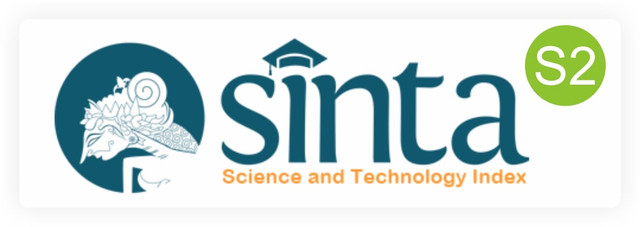The formulation of probiotic Lactobacillus acidophilus granule with acacia and sodium alginate as binding agents
Abstract
Probiotics are living microorganisms that can have a positive impact on health when consumed in adequate amounts. This research aimed to determine the effect of different binders on the viability of Lactobacillus acidophilus, a member of Lactic Acid Bacteria (LAB). The probiotic granules were prepared with wet granulation method using mannitol as the filling ingredient. Formulas I-III used acacia as a binder (3%, 4%, and 5%), while Formulas IV-VI used sodium alginate (1%, 1.5%, and 2%). The probiotic granules produced from all formulas were evaluated for flow time, the angle of repose, compressibility, and LAB viability. The LAB viability test results showed that all of the six formulas met the probiotic requirements, i.e., at least 107 CFUs (Colony Forming Units) per gram. The viable LAB in Formulas I-VI were 3.94x107, 4.4x107, 2.7x107, 2.6x107, 3.5x107, and 2.3x107 CFU/g, respectively. The data were analyzed by comparing the average values of the One-Sample T-Test results, followed by Mann-Whitney test. The results revealed that each formula had different capacity in maintaining the viability of Lactobacillus acidophilus with different binders (i.e., acacia and sodium alginate) as a probiotic product. Formula II (4% of acacia) produced probiotic granules that met the requirements of compressibility and the angle of repose. However, its granular flow time exceeded the standard.
Keywords
Full Text:
PDFReferences
Allen, S.J., Martinez, E.G., Gregorio, G.V., Dans, L.F., 2011. Probiotics for treating acute infectious diarrhea. Sao Paulo Medical Journal.129(3): 185.
Danjo, K., Horisawa, E., Komura, A., Otsuka, 1995. Effect of Binder Characteristic on the Strength of Agglomerates Prepared by the West Method II. Chemical Pharmaceutical Bull 43(3): 488–492.
Goderska, K., Nowak, J., Czarnecki, 2008. Comparison of the growth of Lactobacillus acidophilus and Bifidobacterium bifidum species in media supplemented with selected saccharides including prebiotics. Acta Sci.Pol.Technol.Aliment. 7(2): 5-2.
Haghshenas, B., Abdullah, N., 2015. Microencapsulation of probiotic bacteria Lactobacillus plantarum 15HN using alginateâ€psylliumâ€fenugreek polymeric blends. Journal of Applied Microbiology. 118(4) : 1048-105.
Hidayat, N., Masdiana, C.P., Sri, S., 2006. Mikrobiologi Industri. Andi, Yogyakarta. Pp. 142, 147-148, 152-154, 175.
Hwang, C., Lin, C., Yan, S., Chang, R., Tsen, H., 2015. Enhancement of biomass production and nutrition utilization by strain Lactobacillus acidophilus DGK derived from serial subculturing in an aerobic environment. African Journal of Biotechnology.14(3): 248-256.
Krasaekoopt, W., Bhandari, B., Deeth, H.C., 2003. Evaluation Of Encapsulation Technique of Probiotic Yoghurt. International Daily Journal 13: 3-13.
Lieberman, H.A., Lachman, L., Kanig, J.L., 1994. Teori dan Praktek Farmasi Industri. Volume II. .Edisi III. Translated by Suyatmi S. UI Press. Jakarta. pp. 680-685, 702-703.
Radji, M., 2008. Buku Ajar Mikrobiologi Panduan Mahasiswa Farmasi dan Kedokteran. Kedokteran EGC, Jakarta: 24-25.
Siregar, C.J.P., Wikarsa, S., 2008. Teknologi Farmasi Sediaan Tablet Dasar-Dasar Praktis. Buku Kedokteran EGC. Jakarta. 223.
Sirithanyalug, B., Chaiyavat, C., Sirithanyalug, J., Woraharn, S., 2010. Survival Enhancement of Probiotic Lactobacillus plantarum CMU-Fp002 by Granulation and Encapsulation Techniques. Journal of Microbiology Research. (4): 1- 8.
Standar Nasional Indonesia (SNI). 2009. SNI 2981:2009. Yogurt. Badan Standarisasi Nasional (BSN), Jakarta.
Tamime, A.Y., Saarela, M., Sondergaard, A.K., Mistry, V.V., Shah, N.P., 2005. Production and maintenance of viability of probiotic micro-organisms in dairy products. In Tamime A.Y. (ed). Probiotic Dairy Products. Oxford: Blackwell Publishing Ltd: 39-72.
DOI: http://dx.doi.org/10.12928/pharmaciana.v8i1.9152
Refbacks
- There are currently no refbacks.
Copyright (c) 2021 Ari Widayanti, Lusi Susanah, Priyo Wahyudi

This work is licensed under a Creative Commons Attribution-ShareAlike 4.0 International License.
Office: Faculty of Pharmacy, Universitas Ahmad Dahlan
Jl. Prof. Dr. Soepomo, S.H., Janturan, Warungboto, Umbulharjo, Yogyakarta, Indonesia
Kode pos 55164
Email: pharmaciana@pharm.uad.ac.id










1.png)